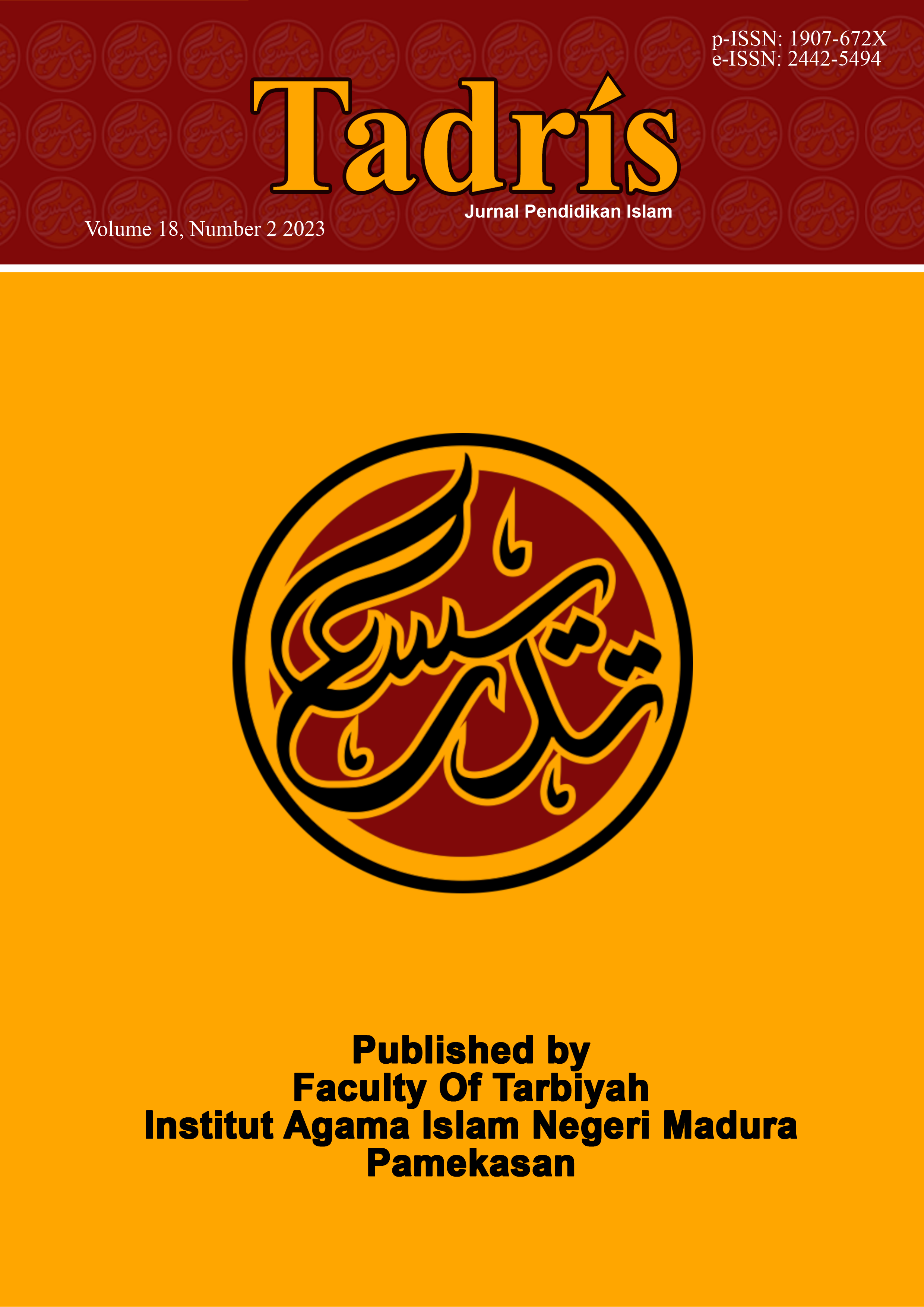Development of Islamic Education Management Based on Cyber Pedagogy: Case Study in Vocational High School
 Abstract views: 486
,
Abstract views: 486
,
 PDF downloads: 276
PDF downloads: 276
Abstract
This study explores cyber pedagogy potential under Islamic education management in vocational school. This study intends to investigate how to support teachers' professional development and mindset enhancement; the implemention; and the way in overcoming obstacles of cyber pedagogy. This research adopts a qualitative field research design with a phenomenological approach. Meanwhile, this study was conducted at Muhammadiyah Kajen Vocational School. This research’s primary data collection methods were observation, documentation, and in-depth interviews, involving six key informants, including stakeholders and teaching staff. The findings reveal that All aspects of educational systems, such as technology proficiency, mindset, and learning design, should be supported by this curriculum. Meanwhile, four steps can be taken to implement cyber-based leaning. The first strategy involves mapping knowledge and skills to needs. Second, the school needs to evaluate students and keep an eye on their performance. Third on the list is developing training based on needs analysis, which is followed by continuous programme assessment and monitoring. In the meantime, this programme adds to certain issues. SMK Muhammadiyah Kajen is noteworthy for its ability to cultivate a digital mindset through the integration of human resources into a digital setting, resulting in a cutting edge, inventive, and contemporary learning environment.
Downloads
References
Azhar. “Online Learning amid the COVID-19 Pandemic: A Case Study of the State Islamic University of Mataram.” Nadwa: Jurnal Pendidikan Islam 14, no. 2 (2021): 265–76. https://doi.org/10.21580/nw.2020.14.2.6639.
Bashori. “Modernisasi Lembaga Pendidikan Pesantren Perspektif Azyumardi Azra.” Nadwa: Jurnal Pendidikan Islam 11, no. 2 (November 17, 2017): 269–96. https://doi.org/10.21580/nw.2017.11.2.1881.
Cerelia, Jessica Jesslyn, Aldi Anugerah Sitepu, Mikayla Almadevi, Mohamad Naufal Farras, Thalita Safa Azzahra, and Toni Toharudin. “Learning Loss Akibat Pembelajaran Jarak Jauh Selama Pandemi Covid-19 di Indonesia.” In Seminar Nasional Statistika X, 14. Departemen Statistika FMIPA Universitas Padjadjaran, 2021. http://prosiding.statistics.unpad.ac.id.
Creswell, John W. Research Design: Qualitative, Quantitative, and Mixex Methods Approaches. London: Sage Publications, 2014.
Hamzah, Amir. Metodologi Penelitian Fenomenologi: Kajian Filsafat Dan Ilmu Pengetahuan. Malang: Literasi Nusantara, 2020.
Indrajit, Richardus Eko. “The Ecosystem Framework For U-Learning Implementation Through Courseware Development And Management.” In ELECTRONIC AND MOBILE LEARNING International Seminar Proceedings, 245–54. Jakarta: Universitas Negeri Jakarta, 2016.
Istanto, Istanto, Fakhruddin Fakhruddin, Heri Yanto, and Hesti Dwi Setyowati. “Principal Leadership Model at Muhammadiyah Junior High School of Surakarta City.” In Proceeding ISET (2021) Universitas Negeri Semarang, 7 (1):778–87. Semarang: Universitas Negeri Semarang, 2021.
Kodrat, Denny. “Mindset Shift in Cyber Pedagogy: A Teacher’s Strategy upon Learning from Home.” Jurnal Kajian Peradaban Islam 3, no. 2 (November 30, 2020). https://doi.org/10.47076/jkpis.v3i2.49.
Makruf, Imam. “Pengembangan Mutu Lembaga Pendidikan Islam Di Era Digital; Analisis Problematika, Tantangan, Dan Strategi.” Pidato Pengukuhan Guru Besar dalam Bidang Ilmu Manajemen Pendidikan Islam, UIN Raden Mas Said Surakarta, 2022.
Moleong, Lexy J. Metodologi Penelitian Kualitatif. Bandung: Remaja Rosdakarya, 2010.
Muhajarah, Kurnia, and Silvia Riskha Fabriar. “Menjaga Mutu Pendidikan Di Tengah Pandemi Covid-19 : Studi Pembelajaran Online Di Universitas Islam Negeri Walisongo Semarang.” JUSTEK: Jurnal Sains Dan Teknologi 3, no. 1 (2020): 42–49.
Mustafa, F., S. Weda, and T. Masykar. “Correlation Between Student Internet Access and Teachers’ Self-Efficacy in Teaching Online Classes.” International Journal of Emerging Technologies in Learning 17, no. 10 (2022): 99–119. https://doi.org/10.3991/ijet.v17i10.25819.
Nisa, Choirun, and Muhammad Khoirurrosyid. “Learning Quality Improvement Management Model for Elementary School Teachers” 07, no. 02 (2023).
Nuri Ningtyas, Dian, and Adison Adrianus Sihombing. “Blended Learning: 21st Century Learning As A ‘Middle-Way’ Maintaining Education Quality In The Era of The Covid-19 Pandemic.” EDUKASI: Jurnal Penelitian Pendidikan Agama dan Keagamaan 21, no. 1 (April 30, 2023): 59–75. https://doi.org/10.32729/edukasi.v21i1.1420.
Purfitasari, Septi, Titi Prihatin, and Sungkowo Edy Mulyono. “Digital Pedagogy sebagai Pendekatan Pembelajaran di Era Industri 4.0.” Semarang: UNNES, 2019.
Putra, Ali Musri Semjan, and Kardina Engelina Siregar. “Challenges and Opportunities for Madrasah in Improving The Competence of Graduate Students.” Al-Tanzim: Jurnal Manajemen Pendidikan Islam 07, no. 02 (2023).
Saifullah Aldeia, Am, Nurul Qolbi Izazy, St Aflahah, and Yuyun Libriyanti. “Modernisasi Manajemen Pesantren Menyongsong Era Society 5.0.” EDUKASI: Jurnal Penelitian Pendidikan Agama dan Keagamaan 21, no. 1 (April 30, 2023): 17–30. https://doi.org/10.32729/edukasi.v21i1.1287.
Stevanus, I., M. Gita, and Debor. “The Impact of Online Learning toward the Independence of Primary School Students During the Pandemic in Jakarta, Indonesia.” International Journal of Online and Biomedical Engineering 18, no. 8 (2022): 23–33. https://doi.org/10.3991/ijoe.v18i08.31965.
Sunarni, and Hari Karyono. “Persepsi Guru Terhadap Implementasi Kurikulum Merdeka Belajar di Sekolah Dasar.” Journal on Education 5, no. 2 (2023): 1613–20. https://doi.org/10.31004/joe.v5i2.796.
Widyasari, Ayu, M Reza Widiastono, Dimas Sandika, and Yushar Tanjung. “Fenomena Learning Loss sebagai Dampak Pendidikan di Masa Pandemi Covid-19.” Best Journal: Biology Education Science & Technology 5, no. 1 (2022): 6.
Wijaya, Toni, and Nurul Hidayati Murtafiah. “Implementasi Manajemen Pendidikan Islam Dalam Meningkatkan Kualitas Pembelajaran Di Era Digital” 02, no. 02 (2023).
Copyright (c) 2023 TADRIS: Jurnal Pendidikan Islam

This work is licensed under a Creative Commons Attribution-NonCommercial 4.0 International License.
The journal operates an Open Access policy under a Creative Commons Non-Commercial 4.0 International license. Authors who publish with this journal agree to the following terms:
- Authors retain copyright and grant the journal right of first publication with the work simultaneously licensed under a
 Commons Attribution-NonCommercial 4.0 International License
Commons Attribution-NonCommercial 4.0 International Licensethat allows others to share — copy and redistribute the material in any medium or format, and adapt — remix, transform, and build upon the material.
- Authors are able to enter into separate, additional contractual arrangements for the non-exclusive distribution of the journal's published version of the work (e.g., post it to an institutional repository or publish it in a book), with an acknowledgement of its initial publication in this journal.
- Authors are permitted and encouraged to post their work online (e.g., in institutional repositories or on their website) prior to and during the submission process, as it can lead to productive exchanges, as well as earlier and greater citation of published work (see The Effect of Open Access).














